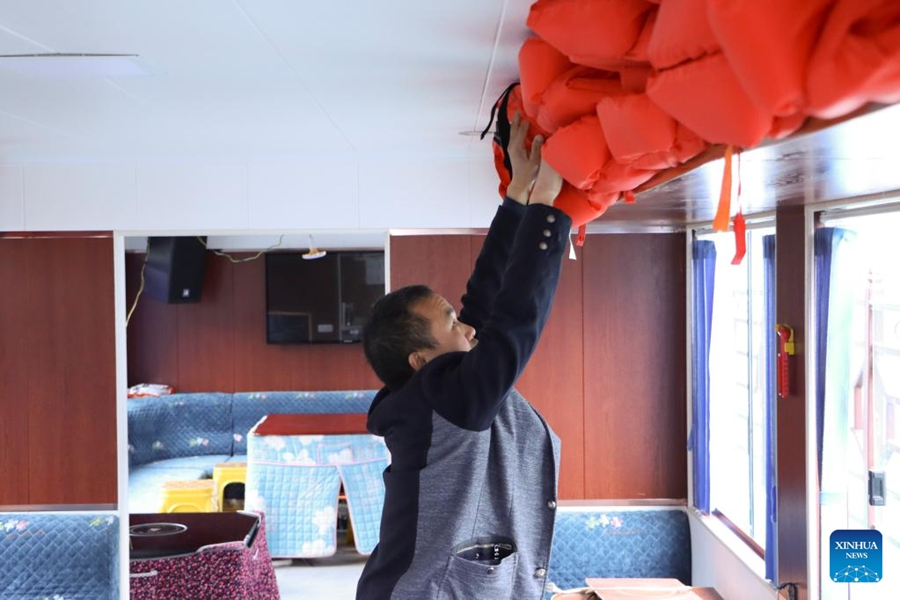Government helps former fishermen land new jobs
Chen Xinjiang arranges life vests on his passenger boat in Sinan county, Southwest China's Guizhou province, March 28, 2023. [Photo/Xinhua]
Cui Lanzhi's home is right next to the Wujiang River, and the weather is cool when the breeze blows in. The location makes her family restaurant popular with diners.
"In addition to workers from nearby, many people drive over from the county seat to eat here," the 45-year-old said.
Cui, who comes from a village in Yanhe county, Guizhou province, used to fish along the Wujiang, one of the tributaries along the upper reaches of the Yangtze River.
She and her husband were able to catch plenty of fish, earning 40,000 yuan ($5,818) for about 100 days of work a year.
"Being fishermen is tough. We dined and slept on the boat back then, and sometimes, we fell into the river," she said. Luckily, they were both great swimmers and never encountered any life-threatening situations.
Gradually, the couple found they were catching fewer fish. In 2013, they spent 300,000 yuan to turn their house into a restaurant, but continued to fish, this time for the diners.
To restore biodiversity, China enacted a fishing ban in 332 conservation areas in the Yangtze River basin in January 2020.
This has since been expanded to a 10-year moratorium along the river's main streams and major tributaries, which took effect on Jan 1, 2021.
In response to the ban, Cui officially retired from fishing in 2019. Later that year, she received a 70,000 yuan subsidy from the local government, which she used to expand her business.
Now, the restaurant can seat 200 people at a time and makes daily revenues of around 3,000 yuan.
"As it gets warmer, more people come to eat here," Cui said, adding that the eatery can make as much as 5,000 yuan a day during peak season.
According to the county government, all of its 165 retired fishermen have found employment.
In Xiazhai, a village in Sinan county, Chen Xinjiang also stopped fishing in 2019 and applied for a license to operate a passenger boat. Supported by subsidized loans, he bought a 50-seat vessel, which he put into service last year.
"I rent my boat out to tourist groups in the daytime and offer night tours for individual travelers in the evening. I can make up to 40,000 yuan a month," the 50-year-old said, adding that he also runs a fish restaurant that makes an annual profit of 100,000 yuan.
Sinan paid out 9.4 million yuan to 121 retired fishermen as compensation or in the form of incentives. The county has also helped them start their own businesses and provided employment training and follow-up services to ensure that every former fisherman found employment.
Chen said his wife has just received cabin service training in Zunyi city.
"As the tourism market rebounds, we will be prepared for the upcoming peak season," he said.